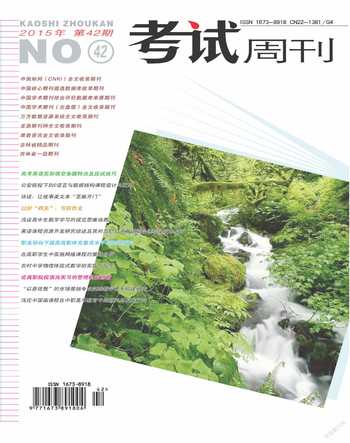中译英常见惯用法错误例析
摘 要: 一般来说,中译英时,词汇和语法方面的错误容易避免,但惯用法方面的错误,稍不留神就会出现在译文中。本文指出《英语世界》中一些中译英译文的错误,通过实例,分析造成错误的原因,并给出地道的译文。
关键词: 中译英 惯用法 错误纠正
一、Choosy的惯用法错误
甚至连我老婆都说,自从积攒外币着魔以后,连吃饭都不再挑嘴了。
《英语世界》8/2014,p.114,所给的译文如下:
Even my old wife cannot help praising me that I have no longer been choosy with food after I reclaimed my hobby of collecting foreign coins.
原译文中形容词choosy 后跟with,不符合英语的表达习惯,be choosy 后要跟介词about搭配使用。例如:
1.I’m very choosy about my clothes.我对自己的衣着很讲究。
2.She’s very choosy about what airline she travels on.她对旅行时乘哪家航空公司的航班非常挑剔。
3.Europeans are getting choosier about what they eat.欧洲人对食品越来越挑剔了。
另外,在fussy,picky,selective,fastidious 及particular后,都可跟about搭配连用。例如:
1.She was always very fussy about her clothes.她对自己的衣服总是十分挑剔。
2.Phil’s not picky about his appearance.菲尔并不十分关注自己的外表。
3.People are becoming more and more selective about what foods they buy.人们对买什么样的食品变得越来越爱精挑细选了。
4.He is very fastidious about how a suitcase should be packed.他对如何打点行装要求很严格。
5.Marty’s very particular about his food.马蒂对食物很讲究。
因此,原译文宜改为:Even my old wife cannot help praising me for the fact that I have no longer been choosy about food since I reclaimed my hobby of collecting foreign coins.原译文中除了choosy with用得不妥外,动词praise处的句型也有问题,根据英语的表达习惯,praise 后一般不可跟that-从句,常见的句型是:praise sth.,praise sb.及praise sb.for sth.。此外,原译文中的连词after也应改为since,after不跟现在完成时连用,而since则可以。
二、Clue的惯用法错误
由此看来,贴年画的风俗在宋代已经初露端倪。
《英语世界》3/2014,p.114,所给的译文如下:
This is a suggestive clue of the New Year picture custom in the making during the Song Dynasty.
根据英语的表达习惯,clue后不跟介词of,要跟to或about,有时也可跟as to。例如:
1.Unexplained weight loss may be an early clue to a health problem.不明原因的体重减轻可能是早期健康问题的迹象。
2.The police think the videotape may hold some vital clues to the identity of the killer.警方认为那盘录像带可能录有能确认凶手身份的一些重要线索。
3.Scientists examine fossils for clues about how dinosaurs lived and died.科学家们研究恐龙化石寻找恐龙如何生活和死亡的线索。
4.This research might provide an important clue about how cancer develops.这项研究可能为癌症如何发展提供一个重要的线索。
5.Childhood experiences may provide a clue as to why some adults develop eating disorders.童年经历可能提供线索,为什么有些成年人会饮食失调。
因此,原译文宜改为:This is a suggestive clue to(或about或as to)the New Year picture custom in the making during the Song Dynasty.
三、Find的惯用法错误
绝大部分在国内已无从得见。
《英语世界》8/2014,p.107,所给的译文如下:
Most of them are not anywhere to find in China today.
原译文有误,根据英语的表达习惯,be not anywhere 或nowhere后跟不可跟动词find的主动式to find,而要跟被动式to be found。例如:
1.The lion was not anywhere to be found.那只狮子哪儿也找不到。
2.We searched the house,but it wasn’t anywhere to be found.我们在屋里找了个遍,但是哪儿也没有看见它。
3.I wanted to talk to him but he was nowhere to be found.我想和他谈谈,但哪儿也找不到他。
4.When her parents came into her room,Emma was nowhere to be found.当艾玛的父母走进她的房间,艾玛不见了。
因此,原译文宜改为:Most of them are not anywhere to be found in China today.
四、Lliken的惯用法错误
在局外人眼里,我的行为似已近乎疯癫。
《英语世界》8/2014,p.114,所给的译文如下:
An outsider may liken my behavior as crazy.
原译文中的liken用法有误,按照英语的表达习惯,动词liken后要跟介词 to,而不跟as。例如:
1.Life is often likened to a journey.人们常把人生比作旅程。
2.The heart can be likened to a pump.心脏可以比作水泵。
3.Critics have likened the new theater to a barn.评论家把新剧院比作一座谷仓。
因此,原译文宜改为:An outsider may liken my behavior to craziness.也可改为:An outsider may regard(或consider)my behavior as crazy.动词regard和consider作“认为”解时,可同介词as连用。
五、Not only的惯用法错误
不仅磁带已经转化为激光唱盘,书库也增加了若干本原版美术画册,而且青少年时期曾一度害过的收集外国硬币癖又旧病复发。
《英语世界》8/2014,p.113,所给的译文如下:
Not only the cassettes give way to laser CDs and the library expands with deluxe albums of fine arts,but the numismatist heat which I had suffered from in my adolescence broke out once more in my coveting foreign coins.
原译文中的not only 用法有误,按照英语的表达习惯,在not only ... but(also)连接的句子中,否定词位于句首,要用倒装语序。例如:
1.Not only is he deeply interested in the subject but all his brothers study it night and day.不仅他对这门功课非常感兴趣,而且他所有的哥哥弟弟日夜学习这门课。
2.Not only did they send home substantial earnings,but they also saved money.他们不仅把可观的工资寄回家,而且存钱。
3.Not only had the poor man been arrested,but he had been sent to prison as well.那个可怜的人不仅被捕,而且被送进监狱。
如果位于句首的not only ... but also 连接的是两个并列主语,则用正常的语序,不用倒装结构。例如:
1.Not only the workers but also the students in the city went on strike.这个城市不仅工人罢工,而且学生罢工。
2.Not only the switches but also the old wiring has been replaced.不仅开关已更换,而且老电线更换。
因此,原译文宜改为: Not only do the cassettes give way to laser CDs and the library expands with deluxe albums of fine arts,but the numismatist heat which I had suffered from in my adolescence broke out once more in my coveting foreign coins.
六、Think的惯用法错误
在表面风光的背后,他们又如何看待自己的未来?
《英语世界》2/2014,p.118,所给的译文如下:
They are everything they seem.But deep in their hearts how do they think of their future?
原译文有误,根据英语的表达习惯,how 不可同think of/about搭配连用,要改为what。例如:
1.What did you think of the film?你觉得这部电影怎么样?
2.What do you think of his wife/my new hairstyle?你对他的妻子/我的新发型怎么看?
3.I still do not know what he really thinks about it.我还不知道他对此的看法。
4.What do you think about this latest government scheme?你觉得政府的这个最新计划怎么样?
但是,how和what都可同feel about搭配连用,意思同what和think of/about搭配用法相仿。例如:
1.How do you feel about all these changes in the curriculum? 你觉得课程中的所有这些变化怎么样?
2.The survey asked what people felt about abortion.调查征求人们对堕胎的看法。
因此,原译文宜改为:They are everything they seem.But deep in their hearts what do they think of their future?也可改为:They are everything they seem.But deep in their hearts how do they feel about their future?
综上所述,我们不难看出,在《英语世界》2014年的期刊中,可能由于原译者的疏忽,因此相关的中译英译文存在不少英语惯用法方面的错误。考虑到《英语世界》是有影响力的期刊,发行量很大,译文中的错误很有可能会误导读者,笔者认为有必要把这些错误提出来,同原译者商榷,供读者参考。
参考文献:
[1]Della Summers.Longman Dictionary of English Language & Culture(English-Chinese)[M].北京:商务印书馆,2005.
[2]Della Summers.Longman Pocket English-Chinese Activator[M].北京:商务印书馆,2007.
[3]Hornby,A.S.Oxford Advanced Learner’s English-Chinese Dictionary[M].北京:商务印书馆,2004.
[4]Jonathan Crowther,Sheilla Dignen,Diana Lea.Oxford Collocations Dictionary for Students of English[M].北京: 外语教学与研究出版社,2003.
[5]Longman Group UK Limited.Longman Dictionary of Contemporary English[M].北京:外语教学与研究出版社,1997.
[6]Longman Group UK Limited.Longman Language Activator[M].上海:上海外语教育出版社,1997.
[7]Pearson Education Limited.Longman Advanced American Dictionary[M].北京:外语教学与研究出版社,2003.
[8]Sinclair,J.Collins Cobuild English Usage[M].上海:上海外语教育出版社,2000.
[9]葛传槼.简明英语惯用法[M].上海:上海译文出版社,1988.
[10]顾祖良.大学英语词语惯用法问答180例[M].苏州:苏州大学出版社,2013.

